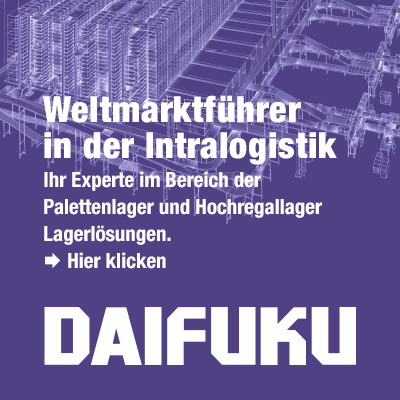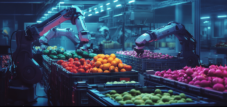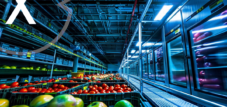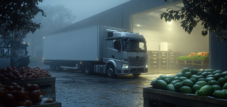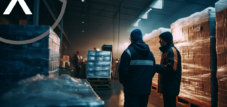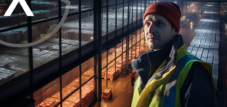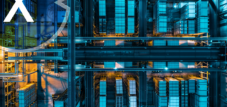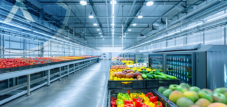From fresh logistics to refrigerated logistics: These challenges shape the cold chain in Italy – Xpert has the answers
Language selection 📢
Published on: December 10, 2024 / update from: December 12, 2024 - Author: Konrad Wolfenstein
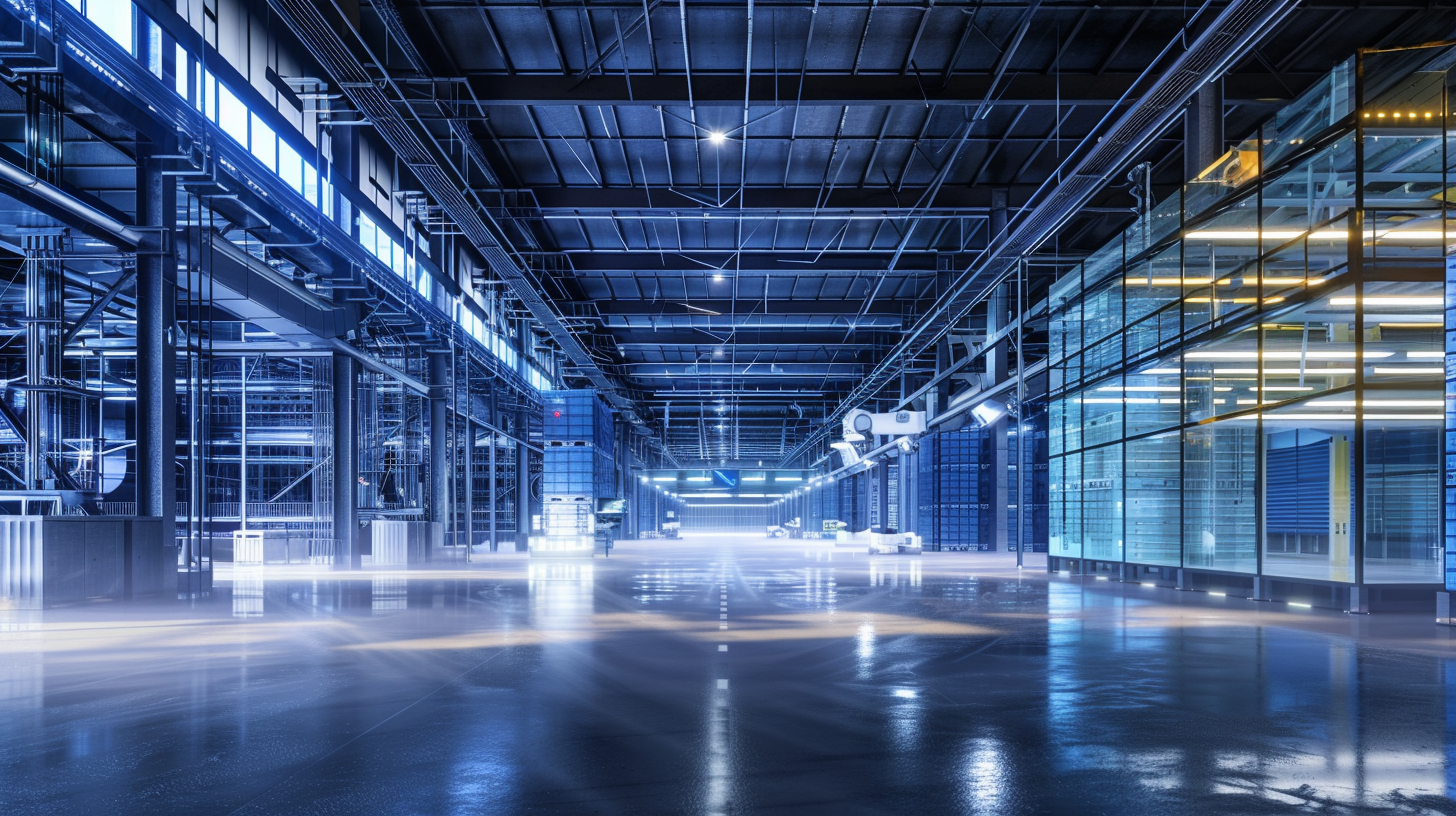
From fresh logistics to refrigerated logistics: These challenges shape the cold chain in Italy – Image: Xpert.Digital
❄️ From fresh logistics to complex refrigerated logistics: challenges and opportunities for Italy
🌱 From fresh logistics to complex refrigerated logistics: In Italy, companies that transport and store sensitive goods such as frozen products, fresh fruit and vegetables or pharmaceutical items face a variety of challenges. These challenges are structural, technological, economic and regulatory. The current situation not only requires a rethink in many areas, but also the use of innovative solutions and strategic foresight in order to remain competitive in the long term. “Italian refrigerated logistics must reinvent itself in order to meet the increased demands on costs, quality and sustainability.” This quote from an industry expert makes it clear that it is no longer enough to simply continue traditional approaches.
The main problem areas are explained in detail below in order to then point out possible solutions and future perspectives. It's not just about presenting deficits, but also about making it clear that every challenge can offer an opportunity for further development. Despite the existing problems, Italian refrigerated logistics has enormous potential to modernize, raise its quality level and not only meet global standards, but help shape them.
1. 💸 High operating costs and economic pressure
A central problem area in Italian refrigerated logistics is the rapidly increasing operating costs. Energy prices in particular have risen sharply in recent years. Both electricity and fuel have become significantly more expensive. This trend means that cold storage, freezing centers and temperature monitoring systems are more expensive to operate than ever before. Transporting temperature-sensitive goods over long distances is also becoming more expensive as fuel costs for trucks, planes and ships skyrocket.
The economic pressure this creates is enormous. Many smaller Italian logistics companies, which were already struggling with narrow profit margins, are now faced with a situation in which they have to realign their calculations. Some companies try to buffer the cost burden through internal efficiency improvements, the introduction of modern cooling technologies or improved route planning. Ultimately, however, it is clear that long-term solutions are required to ensure economic stability.
2. 🛠️ Scarcity of resources and staff shortages
Another problem is the shortage of qualified personnel. There is a lack of well-trained specialists who can operate the technically sophisticated cold storage facilities as well as take on the demanding logistics planning including transport coordination. Many companies are faced with the task of developing new recruiting strategies, creating training opportunities and offering attractive working conditions. “We need more training programs and more modern working models in order to retain skilled workers in our industry in the long term,” emphasizes a managing director of an Italian logistics company.
At the same time, there is often a lack of sufficient storage capacity and means of transport to cope with the constantly growing demand for chilled and frozen products. The expansion of storage areas and cold storage facilities involves high investments that many small and medium-sized companies cannot easily afford. Transportation bottlenecks and lack of storage space lead to delays, perishable goods and ultimately higher costs, which directly or indirectly impact the end consumer.
3. 💻 Technological requirements and digitalization
In times of Industry 4.0 and digitalization, Italian companies are faced with the challenge of integrating modern technologies such as telematics systems, sensors for real-time monitoring of transport temperatures and intelligent warehouse management systems. These investments are often costly, require long-term planning and a rethinking of the operational organization. “Digitalization is not a luxury, but a necessity in order to keep up with international comparisons,” says a supply chain management expert.
In addition, the digital capture and processing of large amounts of data leads to an increased need for IT infrastructure. Companies must invest in powerful hardware, software and security systems in order to be able to effectively use and protect the information generated. Setting up your own IT departments, hiring trained specialists and cooperating with specialized service providers are possible ways to meet these challenges.
An important aspect is the continuous improvement of data analysis. Modern analysis tools make it possible to monitor transport times, cooling temperatures, maintenance intervals of cooling units and many other parameters. This allows weak points to be identified early, energy consumption to be optimized and downtimes to be minimized. Once established, these efficiency-enhancing measures can lead to significant cost savings in the long term.
4. 📜 Regulatory requirements and rising standards
Italian refrigerated logistics is confronted with increasingly strict regulations and quality standards. Compliance with temperature standards, hygiene regulations and documentation requirements is a basic requirement in order to survive on national and international markets. If these standards are not met, there is a risk of severe penalties, damage to the company's image and the loss of important business partners. “Regulations not only serve to protect consumers, but also to ensure high quality standards throughout the entire supply chain,” explains a representative of an Italian chamber of commerce.
In order to meet the increased requirements, companies are investing more in training, certification processes and internal control mechanisms. The implementation of quality assurance systems is a further step towards meeting regulatory requirements and increasing transparency in the value chain. Although such measures involve initial costs, they pay off in the long term in the form of trust, market reputation and stable customer relationships.
5. 🤝 Fragmented market structure and competition
Italian refrigerated logistics is characterized by a highly fragmented market structure. Many small and medium-sized companies have difficulty finding the resources for extensive modernization. This leads to an unbalanced development in which some companies already use state-of-the-art technologies, while others work with outdated infrastructure. The result is an increasing discrepancy in terms of efficiency, quality and competitiveness.
To counteract this trend, some companies are relying on strategic alliances, collaborations and associations. Joint investments in technology, human resources development and research make it possible to exploit economies of scale and increase competitiveness. In addition, such mergers can help to initiate innovation processes and create synergies between the various actors in the supply chain.
6. 🌍 Global events and supply chain disruptions
The COVID-19 pandemic has shown how fragile global supply chains can be. Although demand for frozen products, pharmaceutical products and fresh food rose sharply at times, border closures, transport restrictions and staff shortages led to significant delays, shortages and additional costs. Italian refrigerated logistics had to react quickly to find alternative routes, implement new storage strategies and ensure supplies despite difficult conditions.
These events make it clear that flexibility and resilience are key success factors. Companies are now required to design their supply chains so that they remain functional even in times of crisis. This includes, for example, diversifying supplier relationships, using different means of transport, setting up emergency plans and introducing digital systems that enable rapid adjustment of transport and storage processes.
7. 🌿 Environmental requirements and sustainability
The pressure to reduce CO₂ emissions and comply with environmental standards is also growing in the refrigerated logistics industry. Customers, partners and authorities are increasingly demanding climate-friendly solutions. The switch to more energy-efficient cooling technologies, the use of alternative fuels and the optimization of transport routes are therefore essential. “Sustainability is no longer just a buzzword, but a commitment to society and future generations,” emphasizes an Italian sustainability expert.
Companies are increasingly investing in innovative technologies such as solar power for cold storage facilities, better insulated transport containers and particularly economical refrigeration units. Increased use of electric trucks or hybrid vehicles to deliver temperature-sensitive goods can also help reduce the industry's environmental footprint. In the long term, such measures not only lead to an improvement in the company's image, but can also bring economic benefits through energy savings and government subsidies.
📣 Similar topics
- 📦 Increased efficiency in Italian refrigerated logistics
- 🌱 Sustainability as the key to the refrigerated logistics of the future
- 🚛 Strategies for transporting temperature-sensitive goods
- 📉 Reduce operating costs: solutions for Italian logistics companies
- 🧑🔧 Overcome the shortage of skilled workers: New approaches in refrigerated logistics
- 🖥️ Digitalization and technology in the Italian cold chain industry
- 📜 Regulations and standards: challenges for the industry
- 🌍 Supply chain disruptions: Building resilience in times of crisis
- 🏗️ Market fragmentation: Why cooperation is the future of the industry
- 🥶 Innovation as an opportunity: New ways of Italian refrigerated logistics
#️⃣ Hashtags: #Sustainability #Digitalization #Refrigerated Logistics #Competitiveness #Energy Efficiency
Xpert partner in warehouse planning and construction
❄️🚚 Approaches to solutions and future perspectives for Italian refrigerated logistics
💡🌍Right strategy with Xpert.Digital and partners – decades of intralogistics know-how
Italian refrigerated logistics faces numerous challenges, ranging from rising operating costs to skills shortages and complex regulatory requirements. Nevertheless, these challenges also offer an opportunity to sustainably strengthen the industry's competitiveness through innovative strategies and technological advances. A holistic approach that includes both short-term measures and long-term investments is crucial. The following sections explain central solution approaches and their significance for the future prospects of the industry.
🌟 1. Investments in training and personnel development
The shortage of skilled workers is one of the most pressing problems in the industry. There is not only a lack of qualified personnel, but also of young talent who can ensure long-term stability. Companies must therefore increasingly rely on targeted training and further education programs. These programs should not only promote technical skills, but also teach skills in data analysis and digital process control.
Promoting an attractive corporate culture is another key factor. Flexible working time models, clear career prospects and a focus on work-life balance can help to attract young talent and retain experienced employees in the long term. An industry expert emphasized: “Only those who invest in their team will be able to survive in a highly competitive market in the future.”
🤖 2. Technological modernization and digitalization
Technological innovations are the key to greater efficiency and competitiveness. The introduction of digital monitoring systems, for example, enables real-time control of transport temperatures and thus reduces the risk of quality losses. Intelligent warehouse management systems can optimize inventory turnover and help reduce costs.
A significant advance lies in automation. Automated warehouse systems, autonomous vehicles and robotics can accelerate work processes and partially compensate for the shortage of personnel. At the same time, data analyzes and artificial intelligence offer the possibility of making more precise forecasts and making transport routes more efficient.
🤝 3. Cooperations and networks
The formation of corporate associations, clusters and strategic partnerships is another starting point for overcoming challenges together. By pooling resources and infrastructure, companies can take advantage of economies of scale and reduce investment costs. Such networks also promote the exchange of knowledge and facilitate access to innovations.
For example, research institutes and start-ups that specialize in logistics solutions can provide valuable inspiration for established companies. The joint development and implementation of projects can in turn increase the speed of innovation. Partnerships organized along the entire supply chain also enable greater coordination and transparency.
📜 4. Adaptation to regulatory requirements
Compliance with regulatory requirements is often perceived as an obstacle. But it also offers opportunities. Companies that adapt to new standards at an early stage can not only protect themselves legally, but also strengthen the trust of their customers. Certifications and audits create transparency and increase quality assurance along the entire value chain.
A proactive approach to legal changes and environmental regulations can also be used as a competitive advantage. “Anyone who sees regulations as an opportunity will emerge from the situation stronger in the long term,” explained an industry insider.
⚠️ 5. Risk management and resilience
Global crises such as the COVID-19 pandemic or geopolitical tensions have highlighted the vulnerability of supply chains. Companies must therefore develop effective risk management strategies to be prepared for unforeseen events. Diversifying suppliers and transport routes is essential in order to minimize dependencies.
Digital risk analysis tools can help identify potential disruptions early and develop alternative solutions. Resilience, understood as the ability to adapt to changing conditions, will be a crucial success factor in the future.
🌱 6. Sustainable strategies for a green future
Sustainability is no longer just an ethical concern, but rather a key competitive advantage. Customers and partners increasingly expect climate-friendly solutions and transparent processes. Companies that invest in resource-saving technologies and alternative drives at an early stage not only position themselves as future-oriented, but also secure long-term market shares.
The use of renewable energies, the use of electric or hydrogen vehicles and the reduction of packaging materials are concrete approaches that can already be implemented today. “Sustainability is not a trend, but a necessity,” summarized one expert.
Suitable for:
🚛🌐 Italian refrigerated logistics as an integral part of global supply chains
Italian refrigerated logistics plays a central role in the global supply chain for food, pharmaceuticals and consumer goods. Its importance extends far beyond transport, as it contributes significantly to security of supply and quality assurance. Given the increasing interconnectedness and complexity of international markets, Italian companies must focus more on innovation and efficiency in order to remain competitive.
🌟🌉 Future prospects: seize opportunities, overcome challenges
The coming years will be crucial for the future of the industry. Companies that invest now in modernization, workforce development and sustainable strategies can establish themselves as pioneers in a highly competitive market. Digitalization offers immense potential for optimizing processes and developing innovative business models.
A decisive factor will be the willingness not only to accept change, but also to actively shape it. With a clear focus on quality, resilience and sustainability, Italian refrigerated logistics has the chance to position itself as a role model internationally. By expanding its strengths and specifically addressing its weaknesses, the industry can not only survive in the long term, but also grow and set new standards.
📣 Similar topics
- 🚛 Solutions to the challenges in Italian refrigerated logistics
- 🌱 Sustainability as a key strategy in the cold chain
- 🧑🎓 Combat the shortage of skilled workers – focus on training
- 🌐 Digitalization: The future of Italian logistics
- 🤝 Cooperations and networks: Together for success
- 🔍 Use regulatory requirements as an opportunity
- ⚙️ Technological innovations in refrigerated logistics
- 🌍 Ensuring resilience in global supply chains
- 💡 Future prospects for the Italian cold chain
- 📊 Learning from data: The influence of big data in logistics
#️⃣ Hashtags: #refrigerated logistics #sustainability #digitalization #shortage of skilled workers #resilience
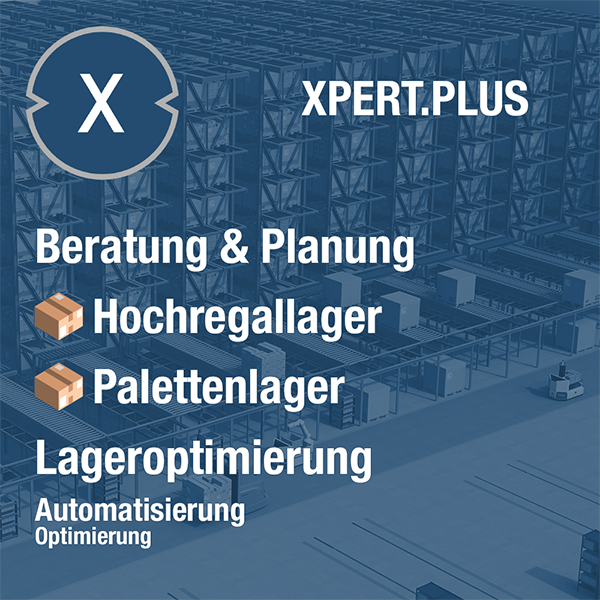
Xpert.Plus warehouse optimization - high-bay warehouses such as pallet warehouses consulting and planning
We are there for you - advice - planning - implementation - project management
☑️ SME support in strategy, consulting, planning and implementation
☑️ Creation or realignment of the digital strategy and digitalization
☑️ Expansion and optimization of international sales processes
☑️ Global & Digital B2B trading platforms
☑️ Pioneer Business Development
I would be happy to serve as your personal advisor.
You can contact me by filling out the contact form below or simply call me on +49 89 89 674 804 (Munich) .
I'm looking forward to our joint project.
Xpert.Digital - Konrad Wolfenstein
Xpert.Digital is a hub for industry with a focus on digitalization, mechanical engineering, logistics/intralogistics and photovoltaics.
With our 360° business development solution, we support well-known companies from new business to after sales.
Market intelligence, smarketing, marketing automation, content development, PR, mail campaigns, personalized social media and lead nurturing are part of our digital tools.
You can find out more at: www.xpert.digital - www.xpert.solar - www.xpert.plus



